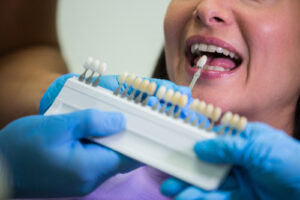Bondings and Laminate Veneers

Dental Bondings
Dental bonding is a quick and affordable cosmetic treatment that uses a tooth-colored resin to repair or enhance your teeth. It’s a versatile option for fixing minor dental imperfections and can be a great way to boost your confidence.
What Can Dental Bonding Fix?
-Chipped or cracked teeth: Perfect for repairing small chips or cracks, restoring your tooth’s shape and strength.
-Gaps between teeth: Helps close small spaces for a more even smile.
– Discolored teeth: Covers stains or discoloration to create a more uniform tooth color.
– Misshapen teeth: Reshapes teeth that are too small, too large, or irregular in appearance.
– Small cavities: Can sometimes be used as a filling material for minor tooth decay.
– Exposed tooth roots: Protects roots exposed by gum recession, reducing sensitivity.
How Does Dental Bonding Work?
1. Preparation: Your dentist will lightly roughen the tooth’s surface and apply a special liquid to help the bonding material stick.
2. Application: A tooth-colored resin is applied in layers, carefully shaped to blend with your other teeth.
3. Curing: The material is hardened with a special light.
4. Polishing: Once set, the bonded area is polished for a smooth, natural finish.
Why Choose Dental Bonding?
– Affordable: It’s a budget-friendly alternative to veneers or crowns.
– Quick: Most bonding treatments take around 1 hour per tooth and can be done in one visit.
– Minimally invasive: There’s little to no enamel removal, so your natural tooth stays intact.
– Versatile: It works for many cosmetic issues.
Things to Keep in Mind
– Durability: Bonding isn’t as strong as veneers or crowns and may chip or stain over time. Expect it to last around 3–10 years with proper care.
– Staining: Although it’s somewhat stain-resistant, the resin can discolor from coffee, tea, wine, or tobacco.
– Not for major repairs: Bonding is best for smaller fixes and isn’t ideal for severely damaged teeth.
How to Care for Bonded Teeth
– Maintain good oral hygiene: Brush and floss daily to keep your teeth healthy and prevent staining.
– Watch your diet: Limit foods and drinks that can stain, like coffee or red wine.
– Regular dental visits: See your dentist regularly to check on the bonding and ensure everything stays in great shape.
Dental bonding is a straightforward and affordable way to enhance your smile with minimal effort. Talk to your dentist to see if it’s the right choice for your goals!

Porcelain Veneers
Porcelain laminates, often called porcelain veneers, are ultra-thin, custom-made shells designed to cover the front surface of teeth and enhance their appearance. They’re a go-to option in cosmetic dentistry, providing a straightforward and effective way to transform your smile.
Here’s a closer look at what porcelain laminates can do and what to expect from the process:
What Can Porcelain Laminates Fix?
-Discolored teeth: They’re great for covering stains from medications like tetracycline, discoloration, or even white spots caused by fluorosis.
-Chipped or worn teeth: Laminates can restore the natural shape and length of damaged teeth.
-Misaligned or uneven teeth: While they won’t replace braces for severe cases, veneers can give the appearance of straighter teeth.
-Gaps between teeth: Laminates can close small gaps, creating a more uniform look.
-Misshapen teeth: Whether your teeth are too small, too large, or oddly shaped, laminates can help refine their appearance.
The Process
Consultation: Your dentist will assess your teeth and discuss your goals to determine if veneers are a good fit.
Preparation: A thin layer of enamel is removed from the front of the teeth to make room for the veneers. Impressions are then taken to design your custom veneers, and temporary ones may be placed.
Fabrication: Your veneers are handcrafted in a dental lab, usually taking a week or two.
Adhering : The temporary veneers are removed, and the permanent ones are carefully bonded to your teeth with a special adhesive. Final adjustments are made to ensure a perfect fit and bite.
Why Choose Porcelain Laminates?
–Natural appearance: Porcelain closely mimics the way natural enamel reflects light, creating a beautiful, lifelike smile.
-Stain resistance: Porcelain resists staining from coffee, tea, and wine, helping your smile stay bright.
-Durability: With proper care, porcelain veneers can last for many years.
-Minimally invasive: Compared to other procedures, the amount of enamel removal is minimal.
Things to Keep in Mind
Cost: Veneers are an investment and can be pricier than other cosmetic treatments.
Irreversible: Since some enamel is removed, the process can’t be undone.
Risk of damage: While durable, veneers can chip or crack under excessive force.
Sensitivity: You might experience temporary sensitivity after the procedure.
Not for everyone: Patients with weakened teeth, severe decay, or habits like teeth grinding may need alternative solutions.
Dental Bonding vs. Porcelain Veneers: What’s the Best Option for You?
Both dental bonding and porcelain veneers can enhance your smile, but they have some important differences. Let’s take a look at their pros and cons to help you decide which one is right for you.
Dental Bonding:
Pros:
Affordable: Bonding is much less expensive than veneers.
-Quick: The procedure is usually completed in just one visit.
-Minimally invasive: It requires little to no removal of enamel.
-Hard to Revers (to an extent): “In the long term, the original tooth layer may be lost as composite bonding and the tooth merge together.”
-Perfect for small fixes: Ideal for minor chips, cracks, gaps, and stains.
Cons:
-Not as durable: Bonding is more prone to chipping, staining, and wear over time, lasting around 3 to 10 years.
-Not as stain-resistant: It may discolor with time, especially from coffee, wine, or tobacco.
-Not for major issues: It’s not ideal for severely damaged or misaligned teeth.
-Less natural look: While the color matches your teeth, bonding might not have the same light-reflecting qualities as porcelain, so it can appear less natural.
-More maintenance: While resistant to stains, you’ll need to take good care of your veneers, especially by avoiding hard foods.
Porcelain Veneers:
Pros:
-Long-lasting: Porcelain veneers are much more durable than bonding, lasting anywhere from 10 to 20 years or more.
-Stain-resistant: They resist discoloration from food and drinks, keeping your smile bright.
-Natural appearance: The translucency of porcelain closely mimics natural enamel, giving your smile an exceptionally realistic look.
-Fix more severe problems: Veneers are great for addressing major issues like significant discoloration, misalignment, or irregular shapes.
Cons:
-Higher Cost : Veneers are significantly pricier than bonding.
-More invasive: Some enamel has to be removed, making the procedure permanent.
-Multiple appointments: You’ll likely need two or more visits to complete the procedure.
-Possible sensitivity: Some people experience temporary tooth sensitivity afterward.
Which One is Right for You?
The best option depends on your budget, needs, and aesthetic goals.
Bonding: It’s a great option for minor fixes, budget-conscious individuals, or those who need a fast solution.
Veneers: These are the better choice for long-lasting, stain-resistant, and highly natural-looking results for those who are willing to invest more.
Talk to your Turkishdentist.com to see which option works best for you. They’ll help you choose the right solution based on your dental needs and personal preferences.

